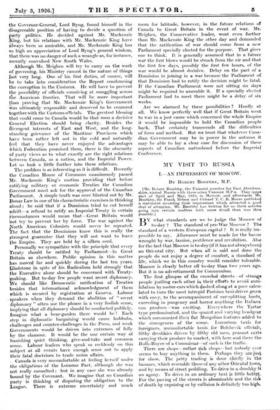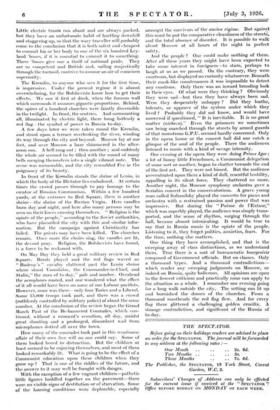MY VISIT TO RUSSIA
[Mr. Robert Boothby, the Unionist member for East Aberdeen. shire, visited Russia with three other Unionist M.P.s. They spordi part of April and May, 192(1, in Moscow, and afterwards Mr. Boothby, Sir Frank Nelson and Colonel T. C. R. Moore published a statement recording their impressions which attracted a good deal of attention. Mr. Boothby has written for us three articles going into certain matters with more detail than was then possible.]
BY what standards are we to judge the Moscow of to-day ? The standard of pre-War Moscow ? The standard of a western European capital ? It is really im- possible to say. Allowance must be made for the havoc wrought by war, famine, pestilence and revolution. Also for the fact that Moscow is to-day (if it has not always been) an Oriental city. But when all is said and done the people do not enjoy a degree of comfort, a standard of life, which we in this country would consider tolerable. Moscow is clearly better off to-day than two years ago. But it is no advertisement for Communism.
The first glimpse of the crowded streets—of strange people jostling each other in their efforts to avoid anni- hilation by motor-ears which dashed along at a pace calcu- lated to turn the most intrepid Parisian taxi-driver green with envy, to the accompaniment of ear-splitting hoots, exceeding in pungency and horror anything the Italians can produce—was exciting. Everywhere the Tartar type predominated, and the quaint and varying headgear which surmounted their flat Mongolian features added to the strangeness of the scene. Luxurious taxis for foreigners, uncomfortable taxis. for Bolshevik officials, filthy droshkies driven by filthy old men, peasant carts carrying their produce to market, with here and there the Rolls-Royce of a Commissar—of such is the traffic.
There are shops—rather rich shops—but nobody ever seems to buy anything in them. Perhaps they are just for show. The petty trading is done chiefly in the bazaars, which resemble those of any other Oricatal town, and by means of street peddling. To drive in a droshicy 14 an agony. To drive in an ordinary taxi is little bettet, For the paving of the streets is abominable and the risk of death by capsizing or by collision is definitely too high. Little electric trains run about and arc always packed, but they have an unfortunate habit of hurtling downhill and staggering up, so that the wary traveller will probably come to the conclusion that it is both safest and cheapest to commit his or her body to one of the six hundred Ley- land 'buses, if it is essential to commit it to something. These 'buses give one a thrill of national pride. They are so competent and British and, sailing majestically through the turmoil, contrive to assume an air of conscious superiority.
The Kremlin, to anyone who sees it for the first time, is impressive. Under the present regime it is almost overwhelming, for the Bolshevists know how to get their effects. We saw it first at dusk, when the famous wall which surrounds it assumes gigantic proportions. Behind, the spires of a hundred churches were faintly discernible in the twilight. In front, the sentries. And surmounting all, illuminated by electric light, there hung listlessly a red flag--the symbol of power in Russia to-day.
A few days later we were taken round the Kremlin, and stood upon a terrace overlooking the river, winding its way through the city and beyond. Moscow lay at our feet, and over Moscow a haze shimmered in the after- noon sun. A bell rang out ; then another ; and suddenly the whole air seemed to be filled with the sound of many bells merging themselves into a single vibrant note. The scene was memorable, and the city resembled Fez in the poignancy of its beauty.
In front of the Kremlin stands the shrine of Lenin, in which the body of the Dictator lies embalmed. At certain times the crowd passes through to pay homage to the creator of Russian Communism. Within a few hundred yards, at the entrance to Red Square, there is another shrine—the shrine of the Iberian Virgin. Here candles burn day and night, and here also many persons may be seen on their knees crossing themselves. " Religion is the opiate of the people," according to the Soviet authorities, who have placarded the city with this and similar infor- mation. But the campaign against Christianity has failed. The priests may have been killed. The churches remain. Once more the choirs sing, the candles are lit, the devout pray. Religion, the Bolshevists have found, is a force to be reckoned with.
On May Day they held a great military review in Red Square. Bands played and the red flags waved as " Budeny's " cavalry clattered past the Lenin shrine where stood Voroshilov, the Commander-in-Chief, and Stalin," the man of to-day," pale and sombre. Overhead the aeroplanes roared, and one wondered what the effect of it all would have been on sonic of our Labour pacifists. However, none was there—only four Tories and a Liberal. Some 15,000 troops took part, and there was a crowd (ruthlessly controlled by military police) of about the same number. At the conclusion of the review began the Grand March Past of the Be-bannered Comrades, which con- tinued, without a moment's cessation, all day, amidst great shouting and a prolonged, discordant wail from microphones dotted all over the town.
How many of the comrades took part in this wearisome affair of their own free will no one could say. Some of them looked bored to distraction. But the children at least seemed to be enjoying themselves, and most of them looked remarkably fit. What is going to be the effect of a Communist. education upon these children when they grow up ? That is one of the riddles of the future, and the answer to it may well be fraught with danger.
With the exception of a few vagrant children—pathetic little figures huddled together on the pavement—there were no visible signs of destitution or of starvation. Some Of the housing conditions werc deplorable, especially amongst the survivors of the ancien regime. But against this must be put the comparative cleanliness of the streets, and the total absence of disorder. It is possible to walk about Moscow at all hours of the night in perfect safety.
And the people ? One could make nothing of them. After all these years they might have been expected to take some interest in foreigners—to stare, perhaps to laugh at us as we passed. On the contrary, they were courteous, but displayed no curiosity whatsoever. Beneath their mask-like countenances it was impossible to detect any emotions. Only there was an inward brooding look in their eyes. Of what were they thinking ? Obviously they were sad—but then they have always been sad. Were they desperately unhappy ? Did they loathe, tolerate, or approve of the system under which they lived ? Probably they did not know, and would have answered if questioned, " It is inevitable. It is no great matter (niehevo)." Even the prisoners we sometimes saw being marched through the streets by armed guards of that monstrous G.P.U. seemed hardly concerned. Only in the opera house or the concert hall did one catch a glimpse of the soul of the people. There the audiences listened to music with a kind of savage intensity.
One evening at the opera they were doing Prince Igor; a lot of funny little Frenchmen, a Communist delegation of some sort or another, began to chatter towards the end of the first act. They were not hissed. But the audience concentrated upon them a kind of dull, resentful hostility, appalling in its silent force. They chattered no more. Another night, the Moscow symphony orchestra gave a Seriabin concert in the eonservatorium. A grave young man called Sofranilsky played the concerto for piano and orchestra with a restrained passion and power that was impressive. But during the " Poeme de l'Extase," which was superbly played, the audience was simply trans- ported, and the sense of rhythm, surging through the hall, became almost intoxicating. It would be true to say that in Russia music is the opiate of the people. Listening to it, they forget politics, anxieties, fears. For the time, nothing else matters.
One thing they have accomplished, and that is the sweeping away of class distinctions, as we understand them. True there is a sort of bureaucratic bourgeoisie composed of Government officials. But no classes. Only a thousand types. And a thousand contradictions— which render any sweeping judgments on Moscow, or indeed on Russia, quite ludicrous. All opinions are open to the fiercest criticism and practically none can apply to the situation as a whole. I remember one evening going for a long walk outside the city. The setting sun lit up and burnished the domes of the churches. From a thousand mastheads the red flag flew. And for every flag there glittered a challenging golden crucifix. A strange contradiction, and significant of the Russia of to-day.











































 Previous page
Previous page